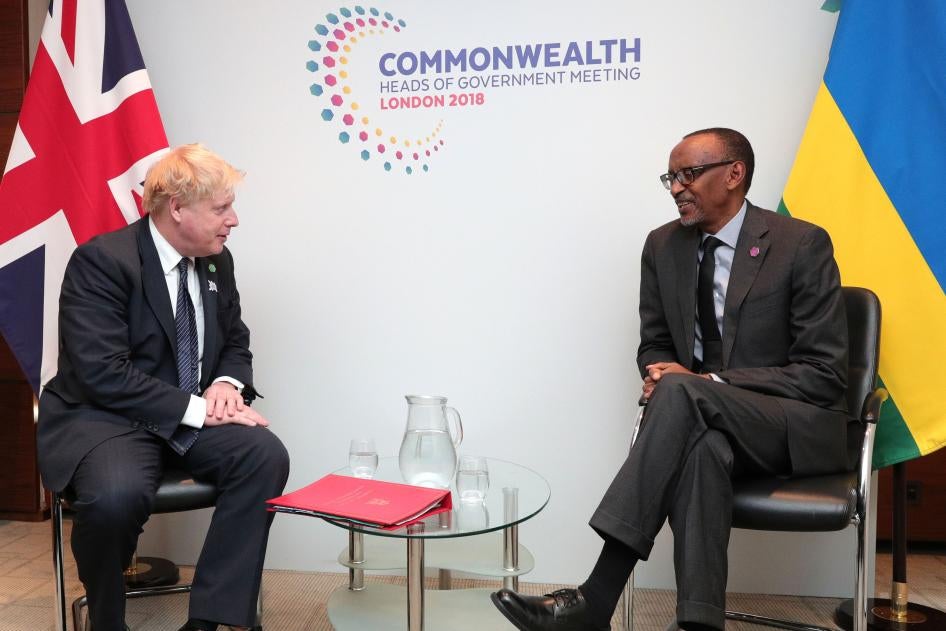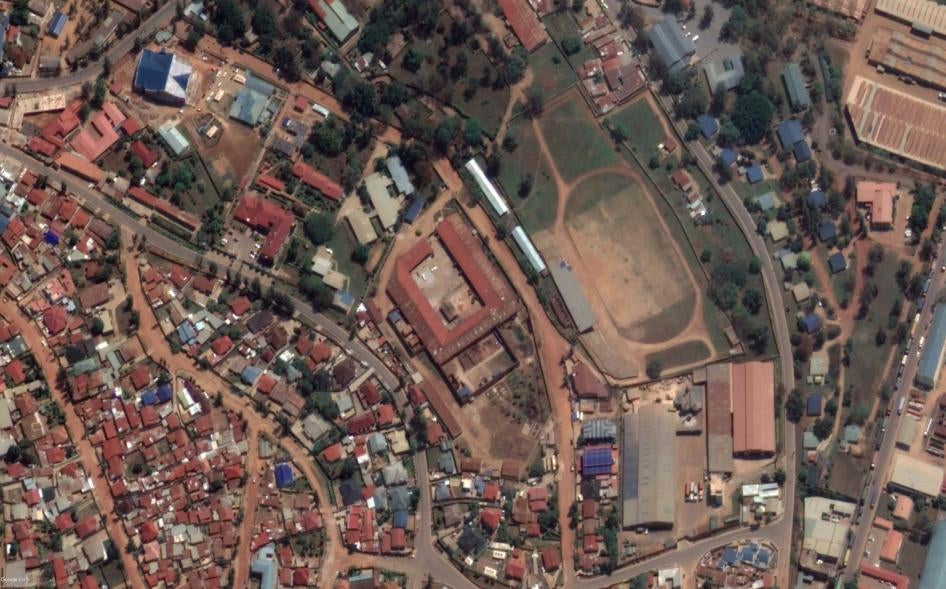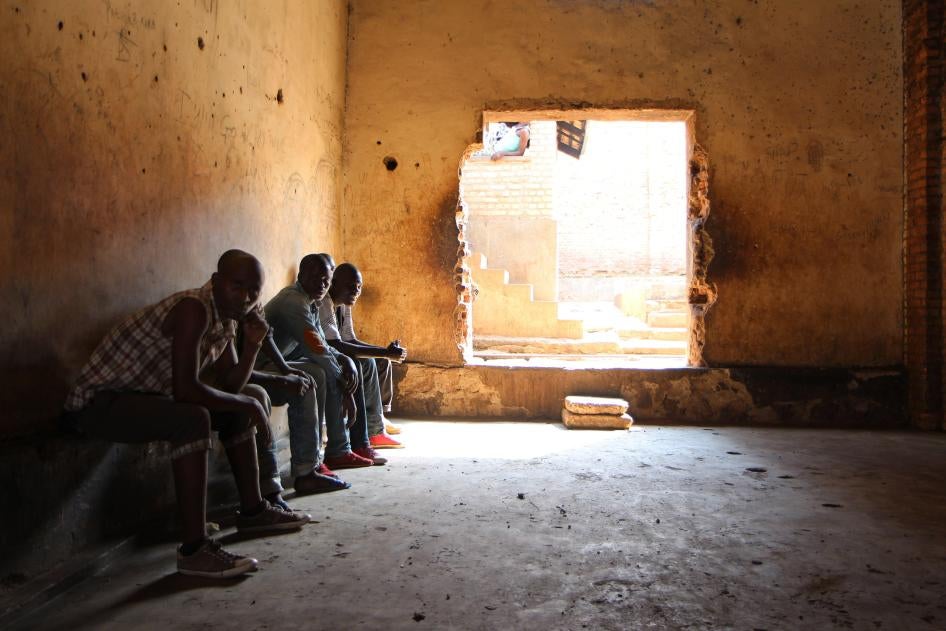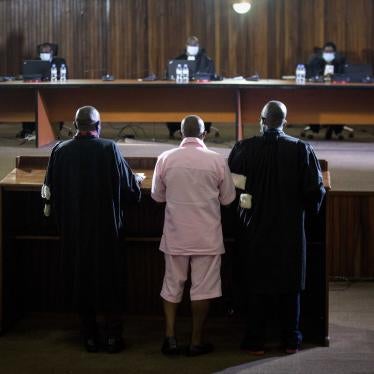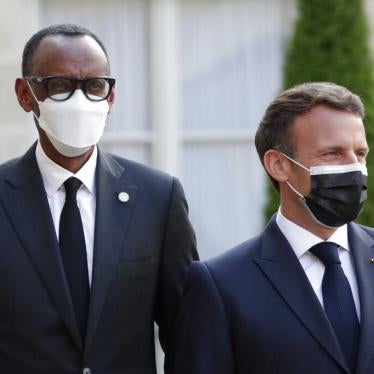(Nairobi) – Rwandan authorities rounded up and arbitrarily detained over a dozen gay and transgender people, sex workers, street children, and others in the months before a planned June 2021 high-profile international conference, Human Rights Watch said.
They were held in a transit center in Gikondo neighborhood of the capital Kigali, unofficially called “Kwa Kabuga,” known for its harsh and inhuman conditions, which appear to have deteriorated further due to the increase in the number of detainees held there and the pandemic. The Commonwealth Heads of Government Meeting (CHOGM), first scheduled for June 2020 and rescheduled for June 2021, was eventually postponed indefinitely in May.
“Rwanda’s strategy to promote Kigali as a hub for meetings and conferences often means continued abuse of the capital’s poorest and most marginalized residents,” said Lewis Mudge, Central Africa director at Human Rights Watch. “As the meeting is rescheduled, Rwanda’s Commonwealth partners have a choice: either speak up for the rights of the victims or be silent as the crackdown is carried out in their name.”
Following reports on abuses at the Gikondo transit center in 2015, 2016, and 2020, this practice was condemned during Rwanda’s review by the United Nations Committee on the Rights of the Child, a Geneva-based treaty body, in February 2020. Between April and June 2021, Human Rights Watch interviewed via telephone 17 former detainees from Gikondo. Interviews with nine people who identified as transgender or homosexual, three women who were detained with their babies, four men who worked as street vendors at local markets, and a 13-year-old boy living on the streets in Kigali, confirmed that patterns of abuse that Human Rights Watch documented previously are ongoing. Due to fear of reprisals against interviewees, Human Rights Watch has withheld all identifying information.
At Gikondo, detainees are held in overcrowded rooms in conditions well below standards required by Rwandan and international law. The former detainees said they have inadequate food, water, and health care; suffer frequent beatings; and are rarely allowed to leave filthy, overcrowded rooms. People were detained there without basic due process standards. None of the former detainees interviewed were formally charged with any criminal offense and none saw a prosecutor, judge, or lawyer before or during their detention. There were no measures to protect people from Covid-19, and former detainees said they did not have access to testing, soap, masks, or basic hygiene and sanitation amenities.
People interviewed who identified as gay or transgender said that security officials accused them of “not representing Rwandan values.” They said that other detainees beat them because of their clothes and identity. Three other detainees, who were held in the “delinquents’” room at Gikondo, confirmed that fellow detainees and guards more frequently and violently beat people they knew were gay or transgender than others.
In the past, round-ups have been connected to high-profile government events, ahead of which security forces may ramp up efforts to “clear up” Kigali’s streets. Human Rights Watch documented a similar round-up in 2016 before an African Union Summit held in Kigali. Ahead of the now postponed 2021 Commonwealth meeting, several former detainees said the police told them they did not want them on the streets during the event.
A civil society activist in Kigali said: “The streets were empty before the meeting. You couldn’t see any street children in town. Even the fruit vendors were taken [to Gikondo]. But now you can see them in the streets again.” Sources in Kigali confirmed that fewer people were living or working on the streets in the month preceding the date for the meeting. Several former detainees said the conditions at Gikondo had worsened in the lead-up to the meeting due to severe overcrowding.
An 18-year-old woman, a street vendor arbitrarily detained for two weeks with her 9-month-old baby, said: “[The police] said the government wanted to clear the city because of CHOGM. They said they would detain us until CHOGM has happened without our filth on display.”
Rwanda is one of a few countries in East Africa that does not criminalize consensual same-sex relations. Vagrancy, begging, and sex work are not criminalized either. Yet the authorities continue to use Gikondo Transit Center to imprison people accused of “deviant behavior that is harmful to the public,” including street vending and homelessness.
Rwanda should urgently close the transit center in Gikondo and amend the legal framework governing the National Rehabilitation Service. The authorities should promptly investigate all reported cases of ill-treatment and beatings of detainees by police and transit center personnel – including reports of detainees dying in detention – and prosecute the suspected abusers, Human Rights Watch said.
“Based on past experience, there is every likelihood that similar patterns of abuse will occur ahead of whatever new date is set for the Commonwealth meeting,” Mudge said. “Locking up marginalized people and abusing them simply because the authorities believe they tarnish their country’s image violates human dignity, and Commonwealth leaders should not tolerate this.”
Gikondo Transit Center
Since 2017, legislation and policies under the government’s strategy to “eradicate delinquency” have sought to legitimize and regulate so-called transit centers, presenting them as part of a “rehabilitation” process aimed at supporting poor and marginalized people. The authorities acknowledge that there are 28 “transit centers” in Rwanda, including “Kwa Kabuga,” the unofficial name of Kigali’s transit center situated in the Gikondo residential suburb of Kigali.
A January 2020 Human Rights Watch report found that the 2017 legislation provides cover for the police to round up and arbitrarily detain people accused of so-called “deviant behaviors” at Gikondo in deplorable and degrading conditions, and without due process or judicial oversight. Detainees are released with very little formal procedure, reflecting the arbitrary manner in which they were initially arrested.
Based on the 2017 legal framework and statements by Rwandan authorities, the broader objective of Gikondo is to serve as a short-term screening center to allow authorities to process detainees to send on to rehabilitation centers. However, in practice, there is no judicial process to determine the length of time people spend at the center or whether they are released or transferred. Some people interviewed said they were released when the center was overcrowded. Two said they were released in June 2021, after the decision to postpone the Commonwealth meeting was announced.
The 13-year-old boy said he was held for two weeks in late April and May, in a room with over 200 other street children, and was released after the announcement: “The police told us: ‘Don’t be afraid, children. The meeting isn’t happening; you’ll be released tomorrow.’” He said that district authorities collected all children detained at Gikondo and returned them to the streets of Kigali. He was not offered support to rejoin his family or return to school.
The civil society activist confirmed that, “Children were detained, moto-taxis had to stop working, street vendors were harassed – all because of the Commonwealth meeting. Since it’s been postponed, the abuse has calmed down.”
Former detainees said police told them that they were “trash,” and that they would be detained during the meeting and released in August. “Before the [Commonwealth] meeting, they would arrest us and seize our goods,” said a 20-year-old street vendor, who was detained for two weeks in April with her 9-month-old baby. “With this meeting coming up … Gikondo [was] very overcrowded.”
Arrest and Transfer to Gikondo
Round-ups by police or officers from the District Administration Security Support Organ (DASSO), a local state security body, are often the first step toward arbitrary detention at Gikondo. The arbitrary nature of the detention is reflected in the complete absence of due process once people are taken to Gikondo. In most cases, detainees are held in various police stations or sector (local government) offices across Kigali before being transferred to Gikondo. None of the interviewees were taken before a judge or given access to a lawyer before being transferred to Gikondo.
Detention of Gay and Transgender People
The detention of transgender people at Gikondo was reported in the media in November 2020. The nine transgender or gay people interviewed by Human Rights Watch were detained at Gikondo between December 2020 and April 2021. They said they had been targeted due to their sexual orientation or gender identity and treated worse than other detainees.
Several said the police or local security officers detained them after members of the public reported seeing them with their partners and other lesbian, gay, bisexual, and transgender (LGBT) people, or wearing women’s clothing if they were perceived not to be female. At Gikondo, police officers or guards accused them of being homeless, thieves, or delinquents and held them in a room reserved for “delinquent” men. One 27-year-old transgender woman said:
They took me at Kabuga and said I was causing problems in Rwanda…. When I arrived, police asked why am I looking like this? Why am I looking like a girl? They asked: ‘Are you a prostitute?’ I said, ‘No, I am a Rwandan.’ They jailed me with other people who were [accused of being] thieves.
One said he was arrested in late December 2020, after leaving a bar in Nyamirambo neighborhood in Kigali: “When we were about to get on motorbikes, local patrol men came and asked us who we are and what we are doing here … they said we don’t represent Rwandan customs. My friend [a transgender woman] has long hair and was wearing a skirt.” Another former detainee was arrested by local security officials in February 2021 after kissing his same-sex partner in a bar. He said customers from the bar insulted them and called the security patrol, who took them straight to Gikondo transit center.
Transgender and gay people interviewed described being harassed, insulted, and beaten by security officials during their arrest and detention. A former detainee who was arrested by DASSO officials in December 2020 said she was taken to the Nyabugogo police station. “They asked me what I was doing … if I am a girl or a boy,” she said. “I said I am a girl and that’s when the problems started … At Kabuga, we were beaten by the leaders. They asked if we were boys or girls.”
A transgender woman detained at Gikondo in February 2021 said: “Police said we were cursed, and asked how we could behave in this way, having sex with people of the same sex as us. They said we’re delinquents and put us in that room. But in the room, we were badly beaten by other detainees and police did nothing despite our cries.” Another gay former detainee who was arrested with a group of transgender people said a policeman beat his feet and told him he should be “rehabilitated.”
Several other former detainees confirmed these patterns of abuse. An 18-year-old street vendor accused of “delinquency” was detained with about 1,000 other men, where he said “men who dressed as women” – referring to transgender people – “were beaten more than the others. We were all beaten but they were really badly beaten.” All transgender women interviewed were housed in male facilities.
Beatings
Beatings often begin as soon as people are rounded up and taken to a nearby police station or post. A 30-year-old woman with a 3-year-old child said:
I was taken to the police, where they kept us in a room with others who had been arrested. At that point we were violently beaten. I had a baby with me, but they still beat me, although they didn’t beat him. At 2 a.m. they transferred us to “Kwa Kabuga.” They told me: “Your baby is none of our business. Get in with the others.” I insulted them, so they beat me badly. They said they don’t want me to do this kind of business [on the streets].
Once detainees arrive at Gikondo, they are registered and often beaten by other detainees. Long-term detainees at Gikondo, known as “counsellors,” are often in charge of daily life in the rooms and beat other detainees. The 30-year-old street vendor said that other detainees in the women’s room beat her and her child: “An adult woman is hit twenty times, whereas her child will be beaten four times. It’s only babies under one year old that are not beaten.”
Interviewees detained in the women’s room also said they were beaten when their child defecated or cried: “We were beaten every day. We were also beaten when we asked for permission to use the toilet. If a baby cried, or urinated, its mother would pay the price,” said the 23-year-old mother of a 2-year-old child, who was detained at Gikondo for three weeks in April.
Guards or “counselors” also regularly beat detainees in the children’s room or rooms for adult men. Children are often beaten when they make noise or play together. “We were beaten a lot…. If you fight, if you make a mistake, or if you shout, they beat you with sticks,” the 13-year-old boy said. A 21-year-old street vendor held in the room for “delinquents” said that detainees are beaten for spending too long in the bathroom, for talking too loudly, or “for any fault you commit.”
Conditions at Gikondo
Conditions in Gikondo Transit Center, as Human Rights Watch has extensively documented since 2006, fall well below international standards and violate Rwandan law.
In March 2020, in response to the Covid-19 pandemic, the UN Subcommittee on the Prevention of Torture called on governments to “reduce prison populations … wherever possible by implementing schemes of early, provisional or temporary release.” Yet Rwandan authorities continued to detain people in Gikondo transit center, without due process or judicial oversight. Overcrowding and poor hygienic and sanitary conditions at Gikondo put people at greater risk of contracting Covid-19 due to close proximity, inability to practice “social distancing,” a lack of adequate sanitation and hygiene, and lack of adequate medical care, including a lack of Covid-19 testing.
During their arrest and transfer to Gikondo, people interviewed said, they were not tested for Covid-19, were not given masks to wear, and were not given the space to maintain distances from other detainees. Many were taken to Gikondo in an overcrowded truck with windows closed. Some said that upon arrival, they washed their hands with water, but were not given soap. One former detainee said hand sanitizer was confiscated by the authorities upon arrival.
Former detainees who were held at Gikondo between 2019 and 2021 estimate that between 50 and 200 girls and boys detained together at a time in the “children’s room,” in deplorable and degrading conditions. But they described conditions in the room for male “delinquents” – which also holds teenage boys – and facilities for adult women with their infants as far worse.
In those two rooms, some children were held together with adults in severely overcrowded conditions and many detainees were forced to sleep on the concrete floor. Former detainees held in the room for “delinquents” estimated that over 1,000 people were held together. One person interviewed said it was not possible to see the floor at night when the detainees attempted to lay down to sleep on the concrete floor.
Most former detainees said they were given food once a day, in insufficient quantities and with poor nutritional value. Food is particularly insufficient for young children and babies, who regularly get sick. One woman said she was released after her baby got so ill he had blood in his stool, while another said her baby had to be transferred directly to a hospital due to malnutrition.
Detainees in the rooms for women and “delinquents” had irregular access to drinking water, sometimes only once a day. “Sometimes we go an entire day without drinking water, and then they give a tiny amount that we all have to share,” said one interviewee who was held at Gikondo for almost all of April.
Sanitation and hygiene conditions are very poor, and many interviewees reported being allowed to wash at most once a week. One former detainee said: “When it’s time to wash, they take a 20-liter basin and around 20 to 30 people wash at the same time.” Former detainees said they were rarely given soap. The mother of a 3-year-old said: “We only washed once a day with filthy water that had worms in it, mostly without soap … we didn’t change our clothes.”
Three interviewees said that during their time at Gikondo, they saw or heard of detainees who had died due to the poor conditions and lack of appropriate medical care. “In the two weeks I spent [at Gikondo] there were three nights where we couldn’t sleep because there were too many people in the room,” said a 40-year-old street vendor detained at the transit center in April. “Two people died because of this treatment and illnesses…. They were ill and had diarrhea and skin rashes. They were refused permission to see a doctor, and one morning they were found dead. I don’t know what caused their death or what their names are.”
Human Rights Watch requested information on these allegations from the Justice Ministry and the National Rehabilitation Service but received no response and was not able to independently verify them.
Lack of Government Response; Criticism by Regional and International Entities
The UN Committee on the Rights of the Child, which reviewed Rwanda’s record on January 27 and 28, 2020, said it was concerned that the reference to “deviant behaviors” in Rwanda’s legislation was leading to “the deprivation of liberty of children in need of protection.” The committee said the abusive detention should end and that the government should change the law.
During the committee’s review, the Rwandan government denied that the detention of street children in transit centers is arbitrary. The government also claimed that children in transit centers are either placed with a family or transferred to a “rehabilitation center” within 72 hours. These claims contradict reports by the National Commission for Children and the National Commission for Human Rights, as well as Human Rights Watch findings.
In response to the Human Rights Watch January 2020 report, then-Justice Minister Johnston Busingye was quoted in KT Press saying: “These children have been redeemed…. We believe they can become useful citizens…. HRW [Human Rights Watch] can come and interview them if they wish.” During Rwanda’s review by the Committee on the Rights of the Child, the gender and family promotion minister, Soline Nyirahabimana, also said that independent observers should visit the center.
On December 4, 2020, the African Court on Human and People’s Rights held that states’ laws enabling the detention of people who, often because of poverty, are forced to live on the street, violate human rights law. The opinion issued in response to a request by the Pan African Lawyers Union, upheld the rights of people deemed “vagrants” by the state. The opinion concluded that laws permitting the forcible removal or warrantless arrest of a person declared to be a “vagrant,” violate the African Charter on Human and Peoples’ Rights and other human rights instruments.
On February 6, 2020, December 14, 2020, and August 23, 2021, Human Rights Watch wrote letters to then-Justice Minister Busingye following up on these statements, requesting access to Gikondo and other transit centers in Rwanda, and asking about steps taken by the Rwanda authorities to remedy the abusive legal framework governing its National Rehabilitation Service. He has not responded.
